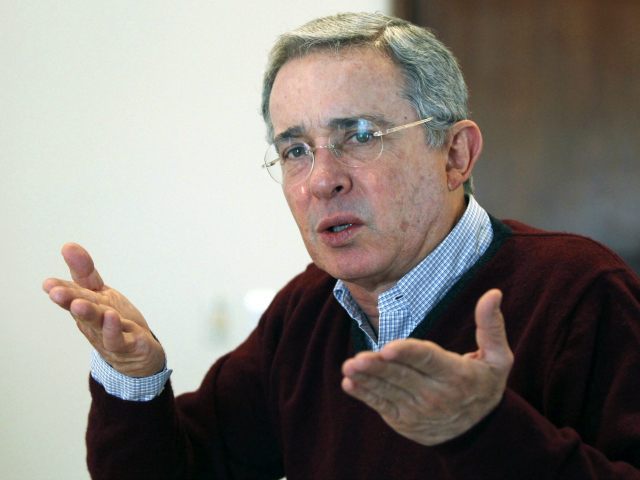Former Colombian President Álvaro Uribe, who during his tenure worked closely with the United States to eradicate Marxist terrorism from the nation, is accusing the current government of detaining his brother Santiago as a “political prisoner,” and President Juan Manuel Santos in particular of “coercing dissidents.”
Santiago Uribe was arrested earlier this month after a former police officer testified that he was responsible for organizing an anti-guerrilla group known as The Twelve Apostles, which operated against left-wing terrorists and assorted criminals out of central Medellín city, where the Uribes are from. The Twelve Apostles were active in the 1990s against, among other groups, the Revolutionary Armed Forces of Colombia (FARC), a Marxist narco-terrorist organization. Santiago, the younger Uribe, is facing charges of murder and conspiracy.
“Santiago Uribe, today a political prisoner, has withstood 20 years of persecution and torture because he is my brother,” former president and current Senator Álvaro Uribe said in a public statement on Sunday, the first since his brother’s arrest. Of Santos, Uribe said that the current president has “brought into submission [the nation’s] institutions and coerced dissidents.” He also dismissed Juan Carlos Meneses, the police chief that testified against his younger brother, as a “false witness” who was “protected by [late Venezuelan dictator Hugo] Chávez and [current Venezuelan dictator Nicolás] Maduro in Venezuela, a well-known fact.”
“Santos has informed journalist, politician, and FARC negotiator friend of his for months that my brother would be captured,” he alleged. The newspaper El Colombiano notes that Uribe’s declarations were seven pages long and claimed that Santiago Uribe had for years been a target of left-wing retribution.
The federal government has yet to make public statements regarding Uribe’s remarks, though some politicians on the left are dismissing his claims as desperate attempts to save his brother’s reputation. Armando Benedetti, a senator and member of Juan Manuel Santos’s party, called the claims irrelevant. “A football player, a priest, or a politician can comment or gossip about a capture, but that does not mean that there was a conspiracy to imprison anyone,” he told reporters.
Álvaro Uribe himself came under investigation late last year for alleged involvement in a 1997 paramilitary attack in his hometown Antioquia province. At the time, Colombian Inspector General Alejandro Ordoñez dismissed the investigation as political, a way of tempting the FARC to come back to the negotiating table. Santos has spearheaded peace talks with the terrorist organizations during his tenure, currently ongoing in Havana, Cuba, where the dictatorship of Raúl Castro provides FARC leadership a safe haven.
“The FARC has always issued as a condition [of any deal] judicial proceedings against ex-President Uribe,” Ordoñez said of the investigation, “that this announcement has been made can be explained as [the government] complying and has a direct relationship with these demands by the FARC.”
“Never have drug lords achieved so much in this country, even under Pablo Escobar,” he added.
FARC leadership is currently in exile in Cuba largely due to counterterror operations ordered by Uribe during his presidency. In the mid-2000s, the Uribe government worked closely with the CIA and President George W. Bush to use tactics perfected against al-Qaeda in Iraq and Afghanistan to target FARC leaders. His supporters suggest Colombia may have become a failed terror state without Uribe’s work alongside the United States.
As a result, a FARC, newly emboldened by peace talks with the Santos government, has become more demanding of actions against Uribe, the former president claims. He has accused the FARC of preventing peasants from attending rallies supporting his political party, in addition to the aforementioned accusations against himself and his brother. Uribe has also accused Santos of accepting money generated from FARC drug trafficking.
Santos and the FARC leadership agreed on a tentative peace deal in September which would allow most of the group’s terrorists to escape prison sentences, instead forced to do “community service” work like removing the thousands of land mines the FARC has placed in civilian territories nationwide. The FARC has repeatedly threatened to leave the negotiating table despite a promise not to extradite exiled FARC leaders, though this week negotiators claim they are finally “very close” to a ceasefire agreement.
“Today, we are very close to an agreement… regarding the cease fire. We have minimal differences regarding procedural matters, but we are days from closing down the agreement,” Carlos Antonio Lozada, a chief FARC negotiator, told the press in Havana this week.
The FARC today remains the world’s wealthiest non-jihadist terrorist organization. Counting jihadist groups, the FARC is the third wealthiest terror group in the world, second only to the Islamic State and Hamas, respectively.

COMMENTS
Please let us know if you're having issues with commenting.